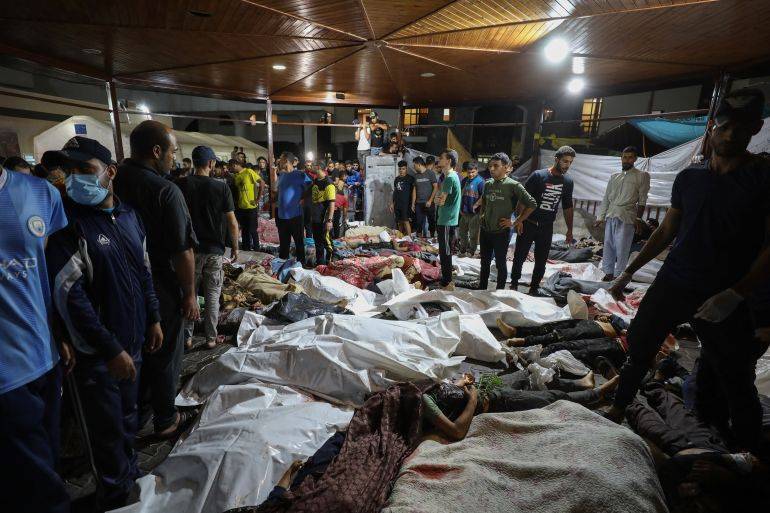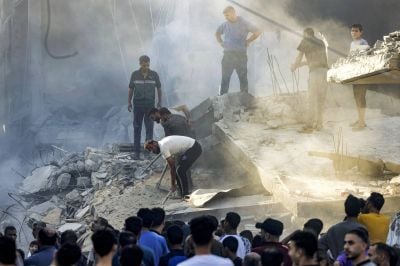
Bodies sprawled on the ground after the bombing of al-Ahli Hospital in Gaza on Tuesday evening. (Credit: Daoud Nemer/AFP)
It was a dark night in Gaza.
Several hundred people were killed on Tuesday evening in a strike on the al-Ahli hospital compound in the north of the besieged enclave.
Palestinians were swift to blame the attack on the Israeli army, which had been relentlessly shelling the Gaza Strip for the past 10 days. Meanwhile, Tel Aviv stated that the explosion in the hospital courtyard was caused by a rocket belonging to the Islamic Jihad movement, which they said had misfired and hit the compound.
The Israelis have presented several elements to support their version of events, a narrative that was endorsed without reservation by US President Joe Biden.
The Israeli account, however, reveals several flaws and inconsistencies, which are even more concerning considering Israel’s history of making false statements in similar cases.
L’Orient-Le Jour takes a deep look at what happened.
The facts
The al-Ahli Hospital in Gaza, housing thousands of patients and refugees, was struck shortly after 7 p.m. on Tuesday.
A widely shared video, verified by major international media, showed a missile directly hitting the building, which immediately burst into flames.
Images showing wounded and charred bodies strewn across the hospital’s corridors and courtyard made the rounds on the internet.
The death toll rose significantly, with the Gaza Health Ministry reporting more than 450 casualties and at least 1,000 individuals missing.
Hamas and the Palestinian Authority (PA) were swift to accuse Israel of carrying out the attack.
Similarly, Hananya Naftali, an Israeli journalist with close ties to Israeli Prime Minister Benjamin Netanyahu, initially posted on his X that “the IDF” had struck the hospital but later deleted the post.
Médecins Sans Frontières (MSF) denounced what they called an Israeli airstrike. Arab countries, including those regarded as Israel’s partners, followed suit.
Western countries condemned the horrifying incident without directly implicating Tel Aviv.
Meanwhile, during his solidarity visit to Israel on Wednesday, Bident told Netanyahu that, “based on what I’ve seen, it appears as though it was done by the other team, not you.”
Biden later mentioned that US “data” from the Pentagon showed that Israel was not responsible for the hospital attack.
The Israeli version
In response to the accusations, Israeli army spokesman Daniel Hagari asserted that it was an Islamic Jihad rocket that had struck the hospital, citing a “preliminary investigation.” The Palestinian Islamist group rejected these claims, stressing they were “lies.”
Later in the evening, Israel’s official account on X released a video aimed at corroborating the Israeli narrative, supposedly demonstrating an Islamic Jihad missile hitting Gaza.
However, the video, which has since been removed, because of its timestamp. Several internet users noted that the video was filmed at 8 p.m., nearly an hour after the attack occurred.
On Wednesday, the Israeli army claimed to have “proof” of Islamic Jihad’s responsibility for the attack.
“According to our intelligence,” Hagari said during a press conference. “It was an Islamic Jihad rocket that had misfired.”
The evidence presented included a voice recording that Israel said it had intercepted, featuring two unidentified Hamas operatives discussing the explosion, with one asking, “Was it fired from our side?”
“Yes, it seems so,” replied the other operative.
Interestingly, the question was asked again, and the same response was provided.
“Surely, it’s no coincidence that the rocket exploded by mistake over a hospital? " asked the first fighter. “It’s because they’re firing from the cemetery near the hospital,” replied the second.
According to two independent Arab journalists, who spoke to UK’s Channel 4 News the recording was a fabrication because of “the language, accent, dialect, syntax and tone, none of which is credible.”
The responsibility for the explosion cannot be determined definitively without conducting an on-site investigation and analyzing missile fragments, military expert and general Khaled Hamade explained to L’Orient-Le Jour.
However, an analysis of the available facts suggests a certain premise.
“Islamic Jihad and Hamas have demonstrated high-level military skills since the beginning of the fighting,” Hamade said. “It is not very likely that they could make such a mistake, especially in Gaza, which is a flat land.”
Operating within flat territories, “does not leave much room for miscalculations.”
“This is not to mention that the hospital is well inside the city and not in a border zone,” Hamade said. “Also, it’s important to mention that Palestinians fire [rockets] only aimed at targets outside the coastal enclave.
“So, if it’s not the Palestinians, it’s the Israelis,” he said.
While Hamas and Islamic Jihad missiles have previously landed inside the Gaza Strip, there is no evidence of them hitting densely populated areas in the city center or causing significant damage. It may, therefore, raise questions as to why this time a missile struck a hospital in the heart of Gaza.
What’s even more intriguing, as reported by Anglican Bishop Hosam Naoum, who manages the hospital, is that the Israeli army had warned the hospital to evacuate everyone from the building. According to al-Ahli Hospital director, Israel had previously targeted the building director.
“The United Nations has documented 58 Israeli attacks on hospitals, clinics and even ambulance drivers in the Palestinian territories,” said researcher Ziad Majed.
Analyzing images
On social media, the conclusions from video analyses conducted by journalists and experts often present conflicting perspectives.
The impact crater appears to be smaller than what would typically result from Israel’s MK-84 bombs. The Israeli army possesses the capability to conduct precise drone strikes.
On the other hand, the nature of the attack and the lack of debris may cast doubt on the theory of a misfired Islamic Jihad rocket.
Several research centers, which L’Orient-Le Jour contacted, declined to comment, stating that they were still in the process of analyzing the available data and that it was too early to provide definitive answers.
British intelligence services also expressed their inability to ascertain clear responsibility due to insufficient information. They called for refraining from assigning blame without a thorough, independent investigation.
Why would Israel take such action?
The attack on the hospital ignited anger across the Arab world and is likely to significantly influence public opinion in the post-war period.
In this context, one might question why Israel would take such a risk.
“Tel Aviv is attempting to make living conditions unbearable for Palestinians, with the goal of partially depopulating the Gaza Strip,” Majed said. “This includes targeting healthcare infrastructure, taking advantage of the perceived impunity that followed the Oct. 7 [Hamas] attack and Western support.”
After Hamas’ surprise attack on Oct. 7, Israel issued an evacuation call to the residents of the northern part of the Gaza Strip, encompassing approximately 1.1 million citizens, in preparation for a ground offensive it plans to carry out.
Israel has been resorting to bombing civilian facilities, aiming to push the population southward, or preferably in its eyes, toward Egypt.
After Tuesday’s blast, Israel pledged humanitarian assistance to Gazans relocating to al-Mawasi in the south, as announced in a statement on Telegram.
The inhabitants of Gaza, described as “human animals” by Israeli Defense Minister Yoav Gallant, have been enduring a severe shortage of water, food and medicine.
They have been under a complete siege since Oct. 9.
The disproportionate use of force against civilians can serve as a tactic to undermine the morale of the enemy.
Syrian President Bashar al-Assad provided a stark example of this in Khan Sheikhoun, in the opposition-held province of Idlib, when he ordered his army to drop sarin gas bombs back in 2017.
Syria’s propaganda apparatus and its supporters claimed the attack was orchestrated by regime opponents, despite clear reports from the Organization for the Prohibition of Chemical Weapons (OPCW).
Some even attributed the incident to a sandstorm.
A history of similar action
The reason Israel’s credibility is now being doubted is because the Israeli state has a history of making repeated false statements in similar situations.
In July 2006, during Israel’s aggressive assault on Qana in southern Lebanon, the Israeli Air Force Chief of Staff, General Amir Eshel, claimed that around 20 civilians lost their lives when a building collapsed amid Israeli bombings. He attributed the collapse to an explosion caused by the presence of a cache of Hezbollah arms and ammunition hidden beneath the building.
International reports later confirmed Israel’s bombing of the building.
In August 2022, the Israeli army eventually acknowledged its responsibility for the deaths of five Palestinian children as a result of an airstrike on a cemetery in the Gaza Strip. This came after months of initially blaming their deaths on Islamic Jihad, which Israel said had missed its intended target.
In the same vein, on May 11, 2022, Palestinian Al Jazeera journalist Shireen Abu Akleh was killed while reporting on clashes in the occupied West Bank.
Israel was swift to accuse the Palestinians of Abu Akleh’s death. However, a few months later, an American police investigation revealed that the Palestinian journalist was killed by the Israeli army.
Currently, neither Biden nor Netanyahu have shown any intention to initiate an investigation into the attack on al-Ahli Hospital.
This article was originally published in French in L'Orient-Le Jour. Translation by Sahar Ghoussoub.


